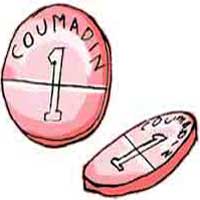Nancy Considers Risks Of Coumadin Therapy
By Adam Pick on June 18, 2008
For most patients, the process of selecting a replacement heart valve can be tricky. These days, there are several options to consider. Plus, we can be influenced and (quite frankly) confused by friends, family members, nurses, cardiologists and surgeons who maintain their own opinions about tissue valves and mechanical valves.
One of the big considerations specific to mechanical heart valve replacements is the use of blood thinners (e.g. Coumadin) to prevent clotting. Patients have different thoughts on Coumadin therapy and its impact on their lives. Some patients feel that using Coumadin is simply “no big deal.” Others find the ongoing use of Coumadin to be burdensome and, at times, problematic.

Recently, I exchanged emails with Nancy from Montana. In her latest email, Nancy identified some interesting thoughts and research about Coumadin. I’m not sure I agree with all of her data (considering I know many patients to live wonderful, long lives on Coumadin), but I thought you might like to hear Nancy’s ideas as she prepares for valve surgery. (With her approval, I am posting her email below.)
Dear Adam,
I am still gathering information on mechanical heart valves and Coumadin. I believe the big risk with the mechanical heart valve is being on Coumadin. I have heard that an individual’s bleeding risk can increase 1-2% per year while on coumadin therapy. So, considering I’ll be 51 at the time of my surgery, I could be on Coumadin for 30+ years. That means my risk from bleeding / stroke could greatly increase during my life.
My surgeon doesn’t seem to think that the FDA clinical trials for Plavix and aspirin are going to work. Evidently there were recent, European trials to determine the optimum INR levels. The levels were determined to be higher than what the current FDA guidelines suggest. My cardiologist, my surgeon and my doctor all talked me out of being in the FDA clinical trials due to the high risk of stroke.
I think I have the facts right but I have been looking at so much data on the internet. I could be confused. I plan to start a major binder with fact sheets so I can keep everything straight.
So you know, I have to have part of my aorta replaced because of dilation. I believe that the surgeon told me that the tubing would not require Coumadin. I want to verify with him again that the aorta replacement would not prohibit me from having an aortic tissue valve replacement at some time in the future.
I am leaning toward having the pericardial valve (cow valve replacement) and then having a valve reoperation later in life. By having to make a decision down the road, I can take advantage of what new technology is available then. If I go with the mechanical valve, I may not have the option to change valves later because it will still be working. Plus, my insurance may not pay for a switch-out operation.
Again, I am still doing more research. At first, I thought “no way” would I have another operation. However, as I research more, I find that the reoperation only has approx 5% risk when you are in your 70’s and I might have a higher risk by being on Coumadin for 20+ years.
These are very tough decisions. I look forward to receiving your book and reading about the surgery.
Nancy
(Billings, Montana)
If you have any ideas or research that you would like to share with Nancy about mechanical heart valves and/or Coumadin, please “Leave A Reply” below.
Keep on tickin!
Adam
|
jerry says on June 19th, 2008 at 1:09 am |
|
I thank Nancy for doing the research. Her conclusion and preference for the cow valve was the same conclusion I drew after speaking to the surgeon. I prefer the odd unexplained desire for alfalfa preferable over the coumadin risks, and the clicking noises. And I’ll take the future operation over the increasing chance of throwing a clot. Now, I have a cardiologist who I like, who completely disagrees with me, and thinks the mechanical valve is the way to go…. |
 |
|
George says on June 19th, 2008 at 3:00 pm |
|
I am going through the same quandry – Mechanical or Biological? I only got told three weeks ago that this surgury is waiting for me (probably early this Fall). I have not met my Surgeon yet, I will on July 22 – he is Dr. John Elefteriades, Head of Cardiothoracic Surgery at Yale University hospital. I am 49 years old – I hear a mechanical valve is good for 35 years and a biological valve is maybe good for 15. I don’t know if I would be willing to go through the surgury again at 65. Do I go with the mechanical? I got Adam’s book on Day 1, after walking out of my cardiologist’s office (actually the first time I had EVER seen a cardiologist). Read the book the day I got it. Still have questions…. feel better, but still have questions. July 22 can’t get here quick enough. |
 |
|
fazilat says on June 19th, 2008 at 4:35 pm |
|
hi |
 |
|
Taylor says on June 19th, 2008 at 7:20 pm |
|
Valve choice definitely isn’t easy. I found the key is doing your homework, getting the best most reliable information you can and making an informed decision. But given the vast amounts of bad information out there about coumadin (on the internet and even direct from doctor’s mouths), it’s important to be “correctly” informed. I’d recommend anyone contemplating valve replacement surgery read the anticoagulation forum at valvereplacement.com. There you’ll find great information about coumadin therapy and some common myths about it. For example, my understanding is that the risks of being on coumadin remain relatively constant and do not exponentially increase with each year. If the risks did increase 2% a year, no surgeon would recommend mechanical valves as the risk of severe complications caused by coumadin would escalate beyond any risk associated with re-operation after only a few years on coumadin. You’ll also find examples of people that ski, ride motorcycles, travel internationally, eat plenty of dark leafy greens, drink socially, live healthy, happy active lives and don’t let coumadin slow them down. People on the site are also honest about what bothers them about coumadin so you get a pretty good idea of what life on it is like. Distilling fact from fiction may be tough but hopefully at the end of your research you’ve come to a decision that you are comfortable with. For me the right choice was mechanical but for others tissue is the way to go. Rest assured though that the vast majority of folks end up thrilled with their decision. |
 |
|
Sean Ripperton says on June 20th, 2008 at 7:21 am |
|
There is a great video (one hour, in 4 parts) from the University of Virginia on managing anticoagulation therapy. The URL is http://discoveryhealthcme.discovery.com/anticoagulation/anticoagulation.html. Then click on “View the PRogram Online”. It’s aimed at medical professionals, but it’s pretty easy for the informed patient to follow. It’s very helpful both for someone planning to go on anticoagulants and for someone trying to decide between mechanical vs biological valves, since it identifies the best way to manage anticoagulation therapy. For some, it will help dispell the myths and make you more comfortable with the drug (and thus with a mechanical valve). For others, it may help you feel more comfortable with your decision to get a biological valve in order to avoid the drug. Regardless of your choice, this video is very educational, and thus very helpful in making the decision on valve type. (My surgery is scheduled for Aug. 6, at Duke University, by Dr. D. Glower. I’m 59, and leaning toward a biological valve with a re-do in my mid-70s and then a mechanical when I’m in my 90s. Target expiration date = 2052, at age 103, while watching the total eclipse of the sun in Georgia in March! I joke, sort of, but that really is my plan! So I’m thinking that 44 years of coumadin is a bit too much. I could be wrong, and I haven’t made a final decision, but I’m happy with my choice so far, if not with my condition, which is aortic insufficiency and aortic root dilation.) |
 |
|
Adam Pick says on June 20th, 2008 at 11:55 am |
|
To Everybody, Thanks so much for taking the time to share your thoughts about Coumadin. I have received a number of “Thank You’s” about this post and your comments from patients and caregivers. Again, many thanks… Keep on tickin! Adam P.S. To Sean, I just posted a separate blog about the Coumadin Video you referenced. Great information! Thanks! |
 |
|
Maureen Sadang says on June 24th, 2008 at 2:58 am |
|
this was really helpful. thanks so much, Adam, for sharing and helping sort out the info. I will view the video too. thanks – I took care of some needed dental work so am looking at the surgery in mid July. thanks, Maureen |
 |
|
nerie says on September 6th, 2008 at 12:32 am |
|
I had undergone aortic valve replacement at the age of 24. I’m on coumadin and still will take for so many years. |
 |
|
Maureen Sadang says on September 8th, 2008 at 1:14 am |
|
Hi Nancy. this is not an easy decision. I am 5 weeks post op having an aortic valve replacement.. I went through the same questions as you, but I am older – 64. I really don’t want to do this surgery again and chose the mechanical valve. The tissue valves will deteriorate in the future – sort of a gradual decline according to what I read. For me, the decision to do coumadin was not easy. If I declined the mechanical valve only because of the coumadin and then for some unforeseen reason wound up taking it anyway, I felt I would be in a double bind! So, I went with the mechanical valve and am on warfarin. it will take while to get the levels evened out, but now am blood testing every 2 weeks instead of weekly. Hopefully that will work out to be monthy in the future. If I was your age, I would probably go with the tissue valve! If you have 10 good years until you need another surgery, who knows what new valves, procedures will be available. Good luck with your decision, Maureen of Maui |
 |
|
Michele Kelly says on October 3rd, 2008 at 3:39 pm |
|
Hi Nancy, I am 42 years old and I am four weeks post op having aortic valve replacement. I wanted a mechanical valve because i did not want to be operated on again. I knew I would be on coumadin for the rest of my life which would not be easy either. It was a hard decision. The surgeon told me before surgery my outflow track may be too small for the mechanical valve and may have to put in the tissue valve. I now have a tissue valve and am very happy. I do not have to be on coumadin!! The surgeon told me after surgery that by the time i need another valve they will able to go thru the groin and they won’t have to crack my chest open again. They are testing these types of things every day. I am confident that in 15-25 years the medical field is going to have a better way of replacing my valve. Good luck, Michele |
 |
|
jim says on January 25th, 2009 at 5:06 pm |
|
i will probably go with the tissue valve which will be in 2 days, wonder in 15 years will the system be overloaded to allow a second operation? but we are not promised tomorrow |
 |
|
James Kauffman says on July 4th, 2010 at 3:12 pm |
|
So, what valve did Nancy select? I am in the same situation. |
 |
|
frank says on December 29th, 2010 at 2:03 pm |
|
70 years old-mechanical aortic valve and des aortic any replaced 4/28/10(70th birthday)-take warfin-ck monthly-golf 5 days wk-walk 18 holes on hilly course-winter months split fire wood and carry in coal plus other chores-have no new problems-clicking a distraction mainly at night-monthly blood ck not problem-eating much same a before surgery and warfin level steady-hope info helps |
 |
|
Jane Faulk says on January 29th, 2011 at 12:27 am |
|
I had open heart in 1986..St. Jude mechanical valve. I am having it replaced Feb. 8 at Duke and also an aortic aneurysm repaired. I have been on coumadin for 25 years and have to have at least two or three protimes a month. My INR has never been regulated and also been on Lovenox injections several times. Also certain meds have caused bleeding issues. I am thinking about having a tissue valve just to be off the coumadin…but so many issues to decide. I was 37 when I had the first surgery so now I am 62. I know there is a strong possibility of having another surgery if I choose the tissue. I need to make a decision and be comfortable with it. I do know about living with coumadin and really it controls my life. I take 10 mgs daily and that is a high dosage. This is the hardest decision I have had to make. |
 |












